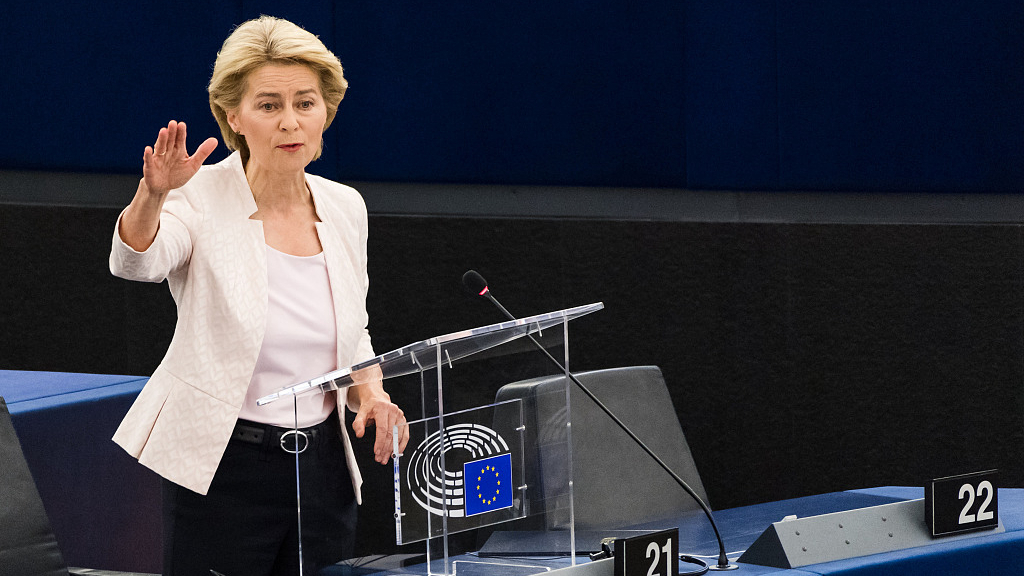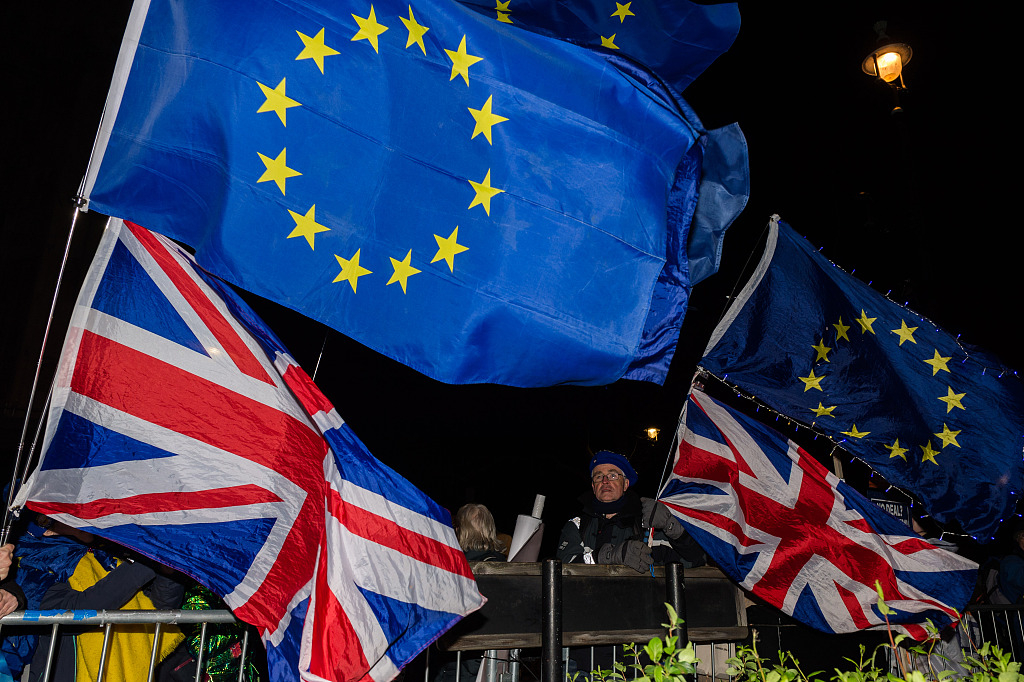

Editor's note: Chris Deacon is a postgraduate researcher in politics and international relations at the University of London and previously worked as an international commercial lawyer. The article reflects the author's opinions, and not necessarily the views of CGTN.
Ursula von der Leyen has been confirmed by Members of the European Parliament (MEPs) as the next president of the European Commission, taking over from the outgoing president Jean-Claude Juncker. MEPs voted by 383 to 327 (with 22 abstentions) to confirm her in the role. What does this confirmation mean for the future of the Brexit process between the European Union and the United Kingdom?
The vote came shortly after Ursula von der Leyen spoke in the European Parliament to outline her vision for several EU policy issues, including Brexit. On that topic, she immediately struck a cordial note by stating that "we cannot talk about Europe without talking about our friends from the UK."
She then went on to argue that the withdrawal agreement negotiated between the EU chief negotiator Michel Barnier and outgoing British Prime Minister Theresa May "provides certainty where Brexit created uncertainty."
Ursula von der Leyen, however, is well aware that May's deal has been voted down multiple times by the UK's House of Commons and that both candidates to become the next prime minister, Boris Johnson and Jeremy Hunt, have committed themselves to reject the deal unless the EU is open to substantial renegotiation.

(L-R) Boris Johnson and Jeremy Hunt participate in a Conservative Leadership televised debate in London, UK, June 18, 2019. /VCG Photo
The EU, for its part, however, has been adamant that the negotiated withdrawal agreement is "the only deal on the table" and will not be reopened for further negotiation. This is particularly true of the so-called Northern Irish "backstop," which the EU sees as essential for any deal.
The backstop, however, is the main objection for both Johnson and Hunt, meaning that a showdown in the run up to the current Brexit deadline of October 31 seems inevitable. The likely two options will be either the UK leaving the EU at that point without a deal, or an agreement being reached between both sides to extend the deadline further.
Both Johnson and Hunt are largely against any further extensions (although Hunt has confirmed that he could seek a short extension if it appeared very likely that a deal was within reach), but it is not out of the question that neither of these men will be prime minister by the end of October, or that parliament will in some other way contrived for an extension to be sought.
The EU's agreement to such an extension, however, would be vital. All those "Remainers" in the UK who hope for a second referendum and for the UK to eventually stay within the EU, therefore, require not just an extension to be sought by their own government but also for the EU to agree to one.

Pro-EU supporters protest outside the Houses of Parliament in London, UK, March 14, 2019. /VCG Photo
Ursula von der Leyen, as president of the European Commission, will have a major say over EU policy in this regard, so her views are important. She has previously expressed support for the finding of some solution that allows the UK to remain in the EU, or – at the very least – for the bloc to be "patient" with the UK.
These comments, however, have been made out of the context of Ursula von der Leyen's new role in the EU. It was, therefore, of vital importance that in her speech to the European Parliament she went on to say: "I stand ready for a further extension of the withdrawal date should more time be required for a good reason."
The importance of this statement was clear from the reaction of MEPs – many cheered and clapped loudly, while others, especially members of the UK's Brexit Party, booed. Since the speech, she has also stated to news sources that both the UK and the EU "should do everything not to have a hard Brexit."
Generally, when European figures refer to a "hard Brexit," they are referring to a no-deal Brexit. Ursula von der Leyen is, therefore, reaffirming her commitment to extend the Article 50 period if this is necessary to avoid such an outcome.
The importance of this position cannot be exaggerated. Ursula von der Leyen will be a central figure in the Brexit process going forward and her hope to extend Article 50 in order to avoid a no-deal Brexit is clear. This could be a vital lifeline for all those in the UK hoping to avoid such an eventuality and, especially, those hoping to eventually reverse Brexit.
(If you want to contribute and have specific expertise, please contact us at opinions@cgtn.com.)

Copyright © 2018 CGTN. Beijing ICP prepared NO.16065310-3
Copyright © 2018 CGTN. Beijing ICP prepared NO.16065310-3